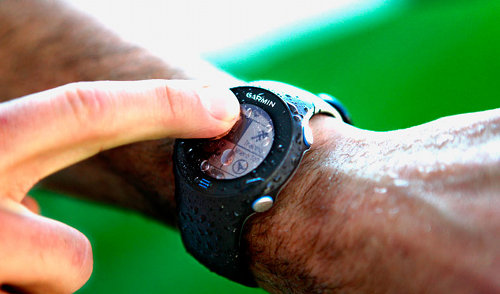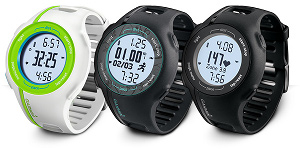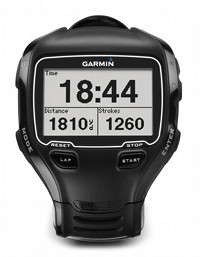
GPS for running
Why use a GPS for running? For one thing it will let you track your athletic performance — not only how far you run, but your heart rate, elevation gain, and more. And it gives you an easy way to maintain a record of your data; just download it to your computer. The units below are less than ideal for navigation, but they are great for capturing your running stats. Here’s a run down (pardon the pun) on a few key models, with the more recent releases shown first:
Garmin Forerunner 10
The newest model, the Forerunner 10, is an entry-level device carrying an MSRP of only $129.99.
Garmin Forerunner 910XT
The other recently introduced model falls at the high end. The Forerunner 910XT (shown a left), is a triathlete’s watch that improves upon the 310XT with a host of new features for swimmers.
Garmin Forerunner 610
A recent introduction, the Forerunner 610 (in the image at the top of this page), eliminates the problematic touch bezel found on the 400 series, replacing it with the Forerunner’s first touchscreen.
Garmin Forerunner 210
 The Forerunner 210 (shown at right), keeps the small form factor of the Forerunner 110, but brings some additional features, including added pace functionality.
The Forerunner 210 (shown at right), keeps the small form factor of the Forerunner 110, but brings some additional features, including added pace functionality.
Garmin Forerunner 110
The Garmin Forerunner 110, is a very basic sports watch. It lacks the touch-screen bezel of other recent introductions, opting for four large buttons instead.
Garmin Forerunner 310XT
The older Garmin Forerunner 310XT is targeted to tri-athletes. It is waterproof to 50 meters and can go for up to 20 hours on one charge.
New on the scene
A couple of new entries into the field have caught people’s attention:
Discontinued models
Garmin Forerunner 410
The high-end Forerunner 410 improved upon the 405 and 405CX’s touch bezel.
Garmin Forerunner 405Cx
A high-end model, the Forerunner 405Cx, increases accuracy in heart rate-based calorie computation and comes with two additional form-fitting bands to accommodate large or small wrists.
Garmin Forerunner 405
The Forerunner 405 built on the feature set found in previous models. Available in either sage green or black, the unit has a sleeker and more watch-like appearance. A wireless connection sends data to your computer, eliminating the need for cables. The perimeter of the unit features a touch-sensitive bezel, minimizing the need for buttons on the unit.
Garmin Forerunner 205 and 305
The Forerunner 205 and Forerunner 305 have greatly improved reception (compared to the first generation models below), and are ideal for trail runners or anyone with a restricted view of the sky. The 305 (pictured at left) ups the ante, adding a heart-rate monitor.
Garmin Forerunner 101, 201 and 301
These first generation products don’t have the killer reception and updated styling of the later models, but they will do just fine for someone running in the open. The Forerunner 101 doesn’t allow transfer of your running data to the computer, and uses two AAA batteries. The Forerunner 201 does allow data transfer, and drops the weight to 2.75 ounces thanks to the li-ion battery. The Forerunner 301 adds a heart rate monitor to this feature set.
Keeping a record of your running data
There are a number of applications that allow you to log your data and maintain a record of it. My favorite is Garmin Connect.
The cell phone alternative
If you have a smartphone, check your market or app store for apps like MapMyRun, RunKeeper or Garmin Fit. Of course the disadvantages are (1) it’s not waterproof (or sweat-proof!) and (2) GPS sucks down phone battery life incredibly fast.
Lead image courtesy Garmin.



How about Foretrex 401 for combined navigation/fitness purposes? Examples might include wilderness trail running or just running in any area that is new to you… such as a new race course. For trail running, you might want to carry a pack for supplies (water, food, first aid, emergency shelter… or even planned overnight shelter). In that case, ETrex 30 or Dakota 20 might also be fine.
The key point here I failed to mention is that all these devices I listed support the ANT+ fitness accessories including heart rate monitor.
It’s a nice unit, but lacks the ability to load maps.